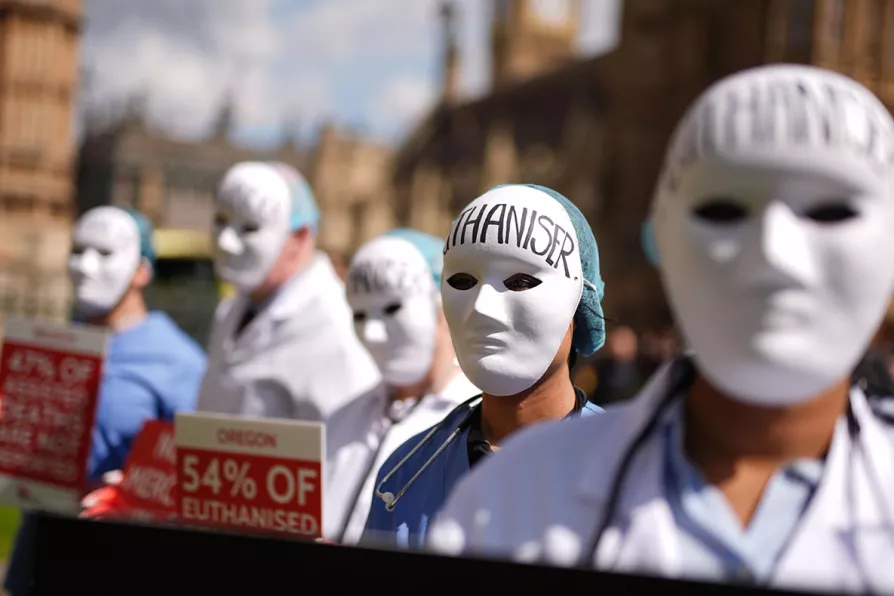
 Campaigners protest outside Parliament in Westminster, London, ahead of a debate in the House of Commons on assisted dying, April 29, 2024
Campaigners protest outside Parliament in Westminster, London, ahead of a debate in the House of Commons on assisted dying, April 29, 2024
ON FRIDAY MPs must vote for or against the legalisation of medically assisted suicide.
MPs are not being asked to vote on a principle, however, but on a specific piece of legislation.
Kim Leadbeater, the MP who has brought forward the End of Life (Terminally Ill Adults) Bill, insists that it has the strongest safeguards of any such legislation anywhere in the world. This stress on safeguards is an acknowledgement of the fear expressed by many disability rights groups and medical professionals that legally assisted suicide can be open to abuse, through pressure or coercion on vulnerable people to end their own lives.
Leadbeater’s confidence in these safeguards has been widely contested. The Bill disallows assisted suicide as a result of coercion or pressure.
“Pressure” is not a legally defined concept: whether berating a sick person over time over the cost of their care, or their occupation of scarce hospital space, would qualify is unclear. In Canada, exactly these scenarios have played out.
Nor is there a mechanism in the legislation by which those approving an application for assisted suicide can look into whether pressure or coercion has been applied. There is no requirement for the High Court judges tasked with approving applications even to speak to the applicant, let alone their GP or family members who might be able to shed light on factors which could have influenced the decision.
Designing adequate safeguards is not easy: sifting enough information to be sure there has been no pressure or coercion could involve a process as complex as child custody proceedings, which would negate the Bill’s concern to make the process relatively quick and stress-free. But this only underlines the enormous complexities inherent in legalising assisted death while protecting those who might be driven to it against their will.
The Bill is keener to minimise potential obstacles to a person’s decision to kill themselves than to investigate its motives. So it allows effectively secret applications, with no requirement to inform a person’s GP or next of kin, further reducing the chance of pressure coming to light. It also allows doctors to suggest assisted suicide to patients.
These weaknesses have been highlighted by the Equality & Human Rights Commission, which notes that since Leadbeater’s is a private member’s Bill, it avoids the need for consideration of whether it conforms to the Human Rights Act.
Campaign group Liberty, which is in favour of assisted death in principle, expresses “serious concerns over how it places disabled people, people of colour and other marginalised communities at risk” and warns too many issues are skirted over to be defined later by ministers. “Good laws do not follow a ‘details later’ approach,” it warns.
As Parliament’s longest-standing MPs Sir Edward Leigh and Diane Abbott jointly write, the restricted debating time and the enormous number of very new MPs lead to the suspicion that lobby groups are seeking to bounce an inexperienced parliament into legislating without due caution.
Endorsing this Bill is at best a leap of faith: it assumes benevolent families and carers and infallible judges.
At worst a willingness to brush over the concerns raised by disability and human rights groups suggests some people’s lives are considered less valuable than others’, something we saw during the pandemic, when Do Not Resuscitate notices were placed on people with disabilities without their consent.
There exists on parts of the left a counterintuitive belief that despite decades of neoliberalism and gutted communities, evolving social attitudes are necessarily progressive.
In fact, from rising misogyny through increased hate crimes to growing vaccine scepticism, we know that prevailing attitudes can become more reactionary.
While dressed up in the mantra of choice, the assisted suicide Bill privileges the rights of those in a social and economic position to exercise autonomy over their lives and deaths over the rights of those in a weaker position to be protected from harm.

Campaigners vow to keep up fight against Assisted Dying Bill as it clears House of Commons

Focus on equal access to assisted death rather than risks of legalisation for oppressed groups wrongheaded, MPs and campaigners say












